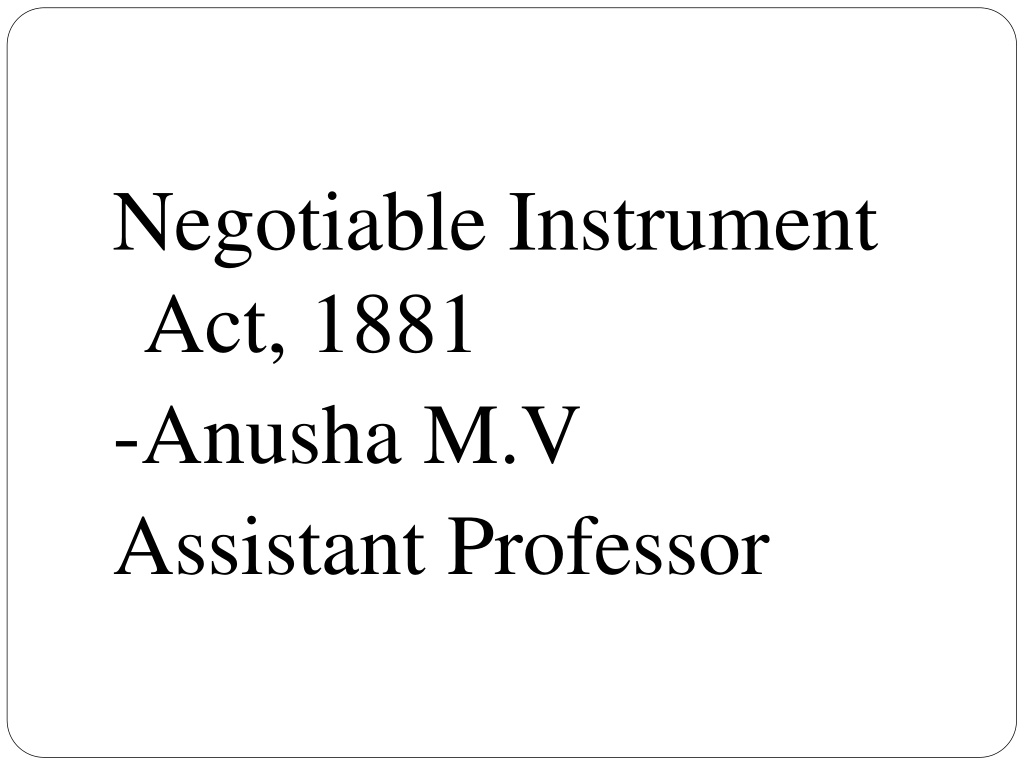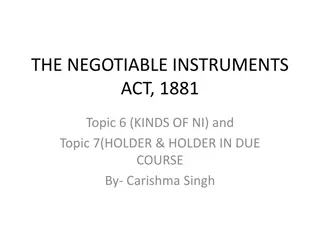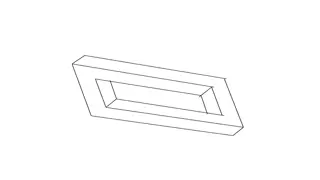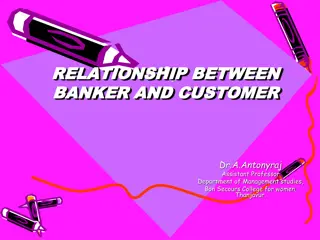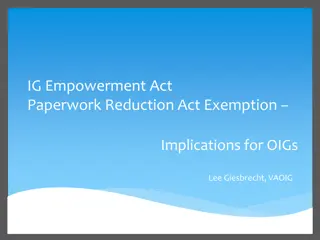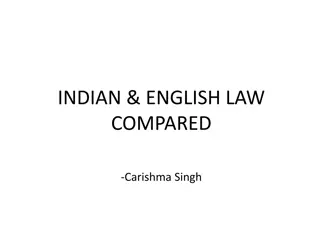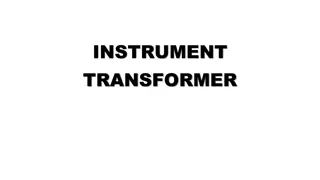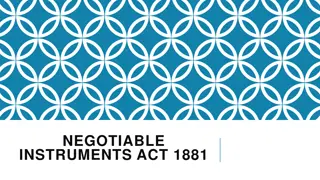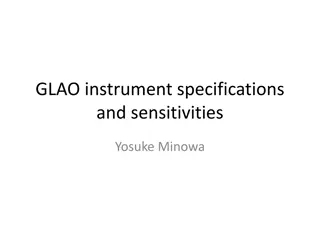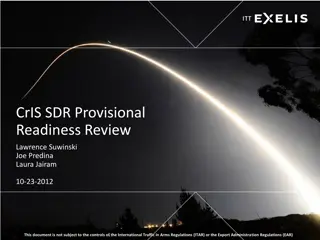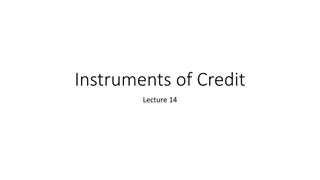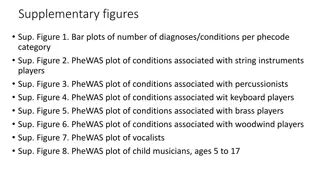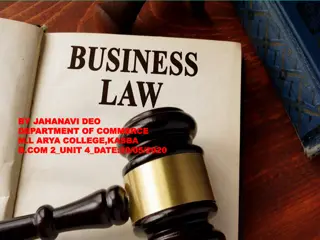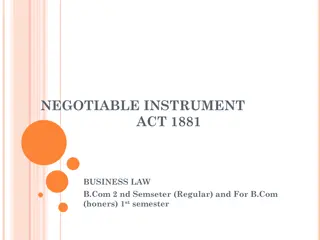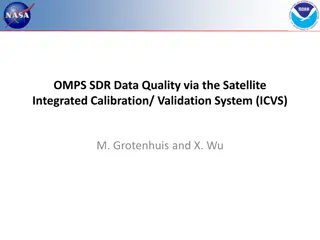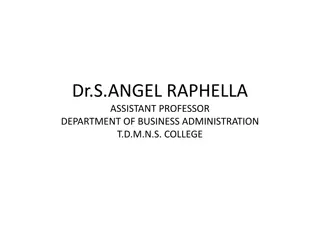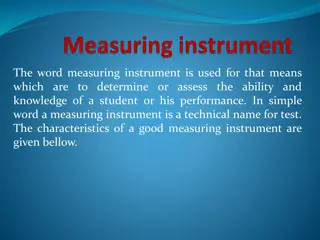Understanding the Negotiable Instrument Act of 1881
The Negotiable Instrument Act of 1881 defines various aspects of promissory notes, such as their form, requisites, and legal implications. It explains what constitutes a promissory note, its characteristics, and how to distinguish it from other instruments. The Act also outlines the importance of an unconditional undertaking to pay in a promissory note and provides illustrative examples to clarify its application.
Download Presentation

Please find below an Image/Link to download the presentation.
The content on the website is provided AS IS for your information and personal use only. It may not be sold, licensed, or shared on other websites without obtaining consent from the author. Download presentation by click this link. If you encounter any issues during the download, it is possible that the publisher has removed the file from their server.
E N D
Presentation Transcript
Negotiable Instrument Act, 1881 -Anusha M.V Assistant Professor
Promissory Note Sec. 4: Promissory note. A Promissory note is an instrument in writing (not being a bank-note or a currency-note) containing an unconditional undertaking, signed by the maker, to pay a certain sum of money only to, or to the order of, a certain person, or to the bearer of the instrument.
Illustrations: A Signs instruments in the following terms: (a ) I promise to pay B or order Rs. 500. (b) I acknowledge myself to be indebted to B in Rs. 1,000, to be paid on demand, for value received. (c) Mr. B, I O U Rs. 1,000. (d) I promise to Pay B Rs. 500 and all other sums which shall be due to him. (e) I promise to Pay B Rs. 500, first deducting there out any money which he may owe me. (f) I promise to Pay B Rs. 500 seven days after my marriage with C. (g) I, promise to Pay B Rs. 500 on D's death, provided D leaves me enough to pay that sum.
Requisites of promissory note 1. Promissory Note must be in writing. Exclude an oral engagement to pay form purview of the Act. It may be handwritten or typed and may be in any language. It may be written on a paper or cloth or any other material that can be used for such purposes. It is not necessary to use the word promise. No particular form of writing is necessary for the validity of promissory note.
To find out whether a particular document is promissory note Surrounding Circumstance under which it came to be executed. Intention of the parties manifest from language of the instrument read as a whole. Where the document is in the form of an acknowledgement coupled with a promise to pay by a particular day, it is a promissory note though stated as hundi. Thus mere nomenclature given to instrument does not determine the nature of instrument.
Negotiable instruments include promissory notes: but an instrument to be known as promissory note need not be negotiable instruments. Sec. 4 did not lay down any rule that an instrument in order to be promissory note must be negotiable. 2. A promissory note must contain an undertaking to pay. A mere acknowledgement of indebtedness without an express promise to pay the debt is not a promissory note. Examples: I have received Rs. 1000/ which I have borrowed from you, and I have to be accountable to you for the same with interest.
Deposited with me Rs. 2000/ to be returned on demand. A holder, who sues on demand instrument without having first demanded payment thereon, may have to bear cost of the action, if debtor shows that he is ready and willing to pay. A promise to pay on demand necessarily implies a promise to pay. A promissory note need not be payable on demand. It may be made payable on a fixed future date or on expiry of a specified date. Promise to pay at certain place
3. the promise to pay should be unconditional If a payment is contingent upon the happening of an uncertain event, it would be invalid even if the event occurs before the expiry of period fixed for the performance of the obligation. A letter requesting a loan stating that the amount lent would be repaid is not promissory note. Examples of instruments not held as promissory instruments: An instrument containing a promise to pay an settlement of account when litigation comes to an end. I promise to pay on demand at my convenience.
I promise to Ramesh of Rs. 500 out of money due to me from Suresh as soon as Suresh pays. A note contained an undertaking to pay on or before specified date and the actions on the note is subject to jurisdiction of India and Singapore, is an unconditional undertaking. A promise to pay the amount after receiving a months notice held to be an unconditional promise. A note is not invalidated by a default clause that allows the promisee to realize the amount from certain properties of promissor, in the event of default to pay.
4. promissory note must be signed by the maker 5. maker must be certain Clear indication as to who undertakes to pay. A promissory note may be made by several persons jointly or jointly and severally. Where a note is made in the form: I promise to pay and is signed by A & B, it is deemed to be made by them jointly and severally liable. I promise to pay A Rs. 1000 & all fines according to rule. Where the rate of interest was not mentioned, a rate of six percent would be applicable under S. 80 of the Act.
7. Instrument must contain a promise to pay money and money only An agreement to containing an undertaking other than to pay money cannot be a pronote. A document containing a promise to pay money in a currency, which is not that of a country where note is made & payable notwithstanding that is a pronote. 8. payee must be certain Where a debtor made an entry of receipt of money in creditor s book & stated that the borrowed money by him would be repaid on certain date, without stating as who was to be payee
a pronote can not be made payable to the maker himself. the requirement as to certainty of the payee does not apply if the note is payable to bearer. however u/s. 31(2) of RBI Act, 1934, no person in India except the RBI or Central Govt as expressly authorized by the Act shall make or issue note payable to bearer. It is usual and proper to state in a note the place where it is made. However omission to do so does not make instrument invalid.
An undated instrument is deemed to have been dated on date of delivery. S.5. Bill of exchange . A bill of exchange is an instrument in writing containing an unconditional order, signed by the maker, directing a certain person to pay a certain sum of money only to, or to the order of, a certain person or to the bearer of the instrument.
Requisites of Bill of Exchange 1. Bill of Exchange must be in writing. 2. Bill of Exchange must contain an order to pay. 3. the order contained in bill is unconditional. 4. Bill of Exchange must be signed by the drawer. 5. The Drawee must be certain. payable at certain place bill cannot be addressed to two or more drawees in the alternative.
P. Chandrabose v. C. Gopalan 2008 CrLJ 953 NOC Mad. Accused had handed over duely filled withdrawal slip to the complainant & the same was dishonoured. It was held that withdrawal slip is not a cheque as it cannot be used in favour of any person other than the account holder. It is not a negotiable instrument as it can not be negotiated. Hence accused cannot be prosecuted for offence under S.138 upon a withdrawal slip being dishonoured due to insufficient funds.
Death of the drawer of the cheque Vijay Singh & Ors. v. Manali & Malik & Ors. If the cheque was not presented during the life time of the drawer, it ceases to be a cheque after demise of the drawer since it ceased to be an order to be an order of a person entitled to make order to the bank to pay the money.
7. Drawer. Drawee.The maker of a bill of exchange or cheque is called the drawer ; the person thereby directed to pay is called the drawee . Drawee in case of need . When in the Bill or in any endorsement thereon the name of any person is given in addition to the drawee to be resorted to in case of need, such person is called a drawee in case of need.
Acceptor.After the drawee of a bill has signed his assent upon the bill, or, if there are more parts thereof than one, upon one of such parts, and delivered the same, or given notice of such signing to the holder or to some person on his behalf, he is called the acceptor . Acceptor for honour . When a bill of exchange has been noted or protested for non-acceptance or for better security, and any person accepts it supra protest for honour of the drawer or of any one of the indorsers, such person is called an acceptor for honour .
Payee.The person named in the instrument, to whom or to whose order the money is by the instrument directed to be paid, is called the Payee . In Pratap Singh Yadav & Anr . v. Behari Pandey son has issued a cheque to discharge debt of his father. Upon cheque being returned dishonored, complaint U/S.138 is filed against the father as well as son.
It was held that only son was liable & not father since offence U/S. 138 is essentially against the drawer of the cheque. A conjoint reading of S. 7 and S. 138 clearly indicates that it is only the drawer of the cheque who can be held responsible for offence under S.138.
In a case, allegation was that the accused gave a cheque. There was no proof of the fact that the cheque was drawn and executed by accused. It was held that execution is different from issuance of cheque.
Acceptance: The acceptance of bill of exchange is the signification by the drawee of his assent to the order of the drawer.. Where the drawee writes on a bill accepted but does not sign it, it not an acceptance. The drawee of the bill is not liable on the bill in the acceptance
An acceptance by the drawee to perform his promise by means other than by the payment of money is invalid. For instance a bill is drawn by A on B for Rs. 5000. B accepts it as payable in bills or payable in goods. This is not a valid acceptance.
Holder S.8. Holder . The holder of a promissory note, bill of exchange or cheque means any person entitled in his own name to the possession thereof and to receive or recover the amount due thereon from the parties thereto.
Where the note, bill or cheque is lost or destroyed, its holder is the person so entitled at the time of such loss or destruction. Essentials: Entitled to possession in his own name. Right to receive or recover the amount due
The Bill of Exchange Act, 1882 holder means the payee or indorsee of a bill or note who is in possession of it, or the bearer there of. Comparison: While possession is essential in case British legislation.
A person may be entitled to possession of the instrument although he does not actual possession. Example, where the bill is payable is without indorsement, entrusted by the payee to his agent, agent does not become the holder & the payee is entitled in his own name to the possession of the bill. The holder of an instrument should be owner thereof.
Holder means only a dejure holder & not de facto holder. the assignee of a note or bill is not a holder, unless the instrument is indorsed in his favour or payable to bearer & in his possession. Right to recover or receive implies that he has right to sue on the instrument. Holder does not include a person who does not have a right to recover the amount due thereon from the parties thereto, though he is possession of the instrument.
To qualify as a holder, a person should have derived title to the instrument in a lawful manner. A person who takes instrument from a person, who forges an indorsement or from thief or from a finder of a instrument or a payee or indorsee, who is prohibited by the court order from receiving the amount is not a holder.
A, a debtor of B, executed a note in favour of C in discharge of B s debt to C. it was held that C could sue A on the note & A could not avoid liability by pleading that he had only executed the note on behaf of B & later repaid debt to B.
